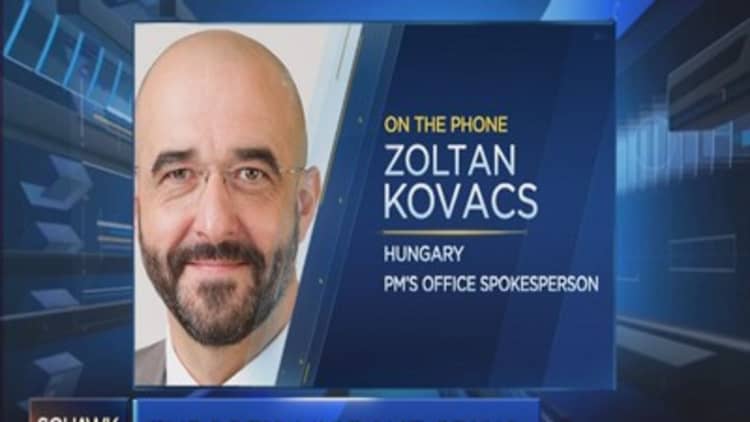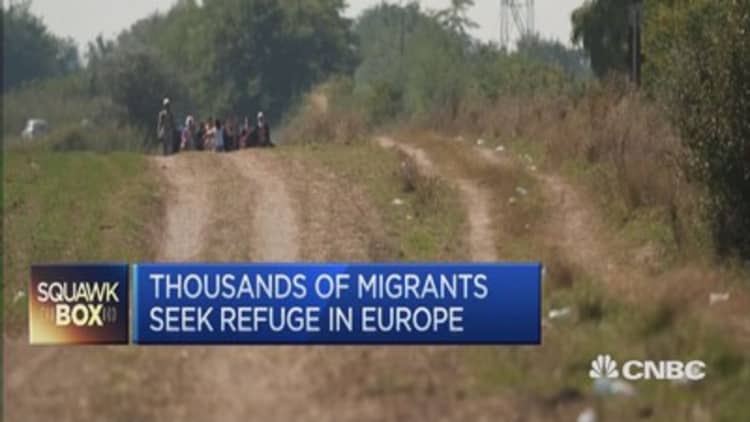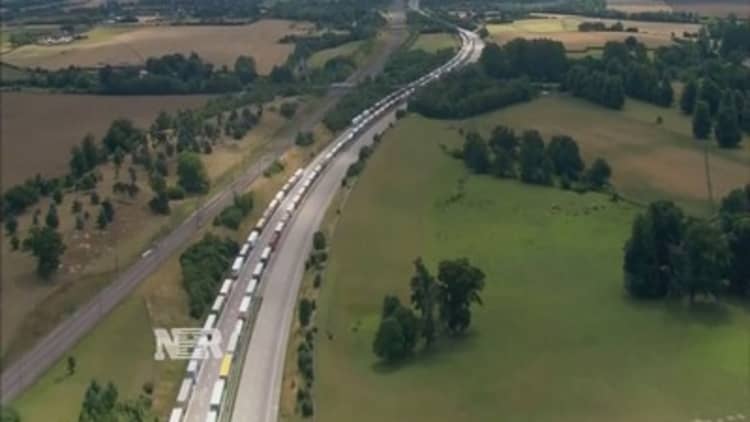


Hungary is under fire for controversial tactics used to curb a mass flow of migrants seeking asylum in Europe, but a government spokesperson told CNBC on Wednesday the country is simply enforcing European law.
Authorities have blocked migrants from onward travel to the rest of Europe, temporarily sealing a main train station in the capital city Budapest Tuesday before announcing that only passengers with valid identification would be allowed to travel, and separately process ticket sales for non-EU residents.
Zoltan Kovacs, a government spokesperson for the Hungary's Prime Minister's Office, said the moves were necessary given the staggering number of migrants flowing through the country.
"What we're trying to establish is law and order," Kovacs told CNBC on Wednesday. He said 160,000 migrants were expected to enter Hungary this year alone, and that it would take time to register and establish their identity in line with European protocols.
"Nobody's entitled, even in possession of a train ticket, to leave Hungary, until his or her identity is established and valid papers are provided. And that's in the best interest of not only Hungary, but of all European member states," Kovacs said.
"It's legally impossible that we let people go," he added.
A ‘mass migration crisis’
It comes as Hungary rushes to complete construction of a four-meter tall fence along sections of its border with Serbia in a bid to block further illegal border crossings.
"You have to keep in mind that Hungary's border with Serbia is not simply the border of the two countries, but it is the Schengen border, and within the Schengen borders you have fundamental European values and freedom," Kovacs said.
The 'Schengen zone' refers to 25 states on the European continent that allow free movement without border controls and includes Hungary, France, Germany, Poland, Vienna and Spain. Serbia, which flanks Hungary's southern border, is not part of the Schengen agreement which was first signed in 1985.
France's Foreign Minister this week criticized Hungary for erecting the wall, telling Europe 1 radio that it symbolized a lack of respect for European values.
Many of the migrants and refugees coming to Europe have been fleeing violence in countries across the North Africa and the Middle East, including war-torn Syria.
"This is not simply a refugee crisis, this is a major mass migration crisis," Kovacs said. Without effective border controls, he said Europe would fail to cope with the sheer volume of migrants landing inside Europe.
"We have to stop the illegal flood of migrants. Without reestablishing discipline at the border of the European Union, we will not be able to hand this situation" he said.
"The European migration and refugee system has basically failed," Kovacs told CNBC.
Towards a coordinated solution
Some leaders have discussed mandatory quotas, requiring each country to take a similar proportion of refugees and migrants in order to alleviate pressure on countries such as Italy and Greece where over 310,000 migrants have landed after crossing the Mediterranean, according to estimates by United Nations High Commissioner for Refugees.
Germany has been praised by European counterparts for the financial support it plans to set aside in refugee benefits in 2016, which is expected to top 3.3 billion euros ($3.7 billion).
Speaking to CNBC on the sidelines of the Handelsblatt Banking Summit in Frankfurt, Jens Spahn, the parliamentary state secretary for Germany's Federal Ministry of Finance, said it was also key that each country equally share the burden.
"We do need to support the people coming to us but on the other hand we do need a European solution as well.... It can't be that only Austria, Germany, Sweden and Hungary are the ones dealing with this problem. We do expect more help as well from our European partners."
European ministers have set an emergency meeting to discuss the migrant crisis on September 14.


